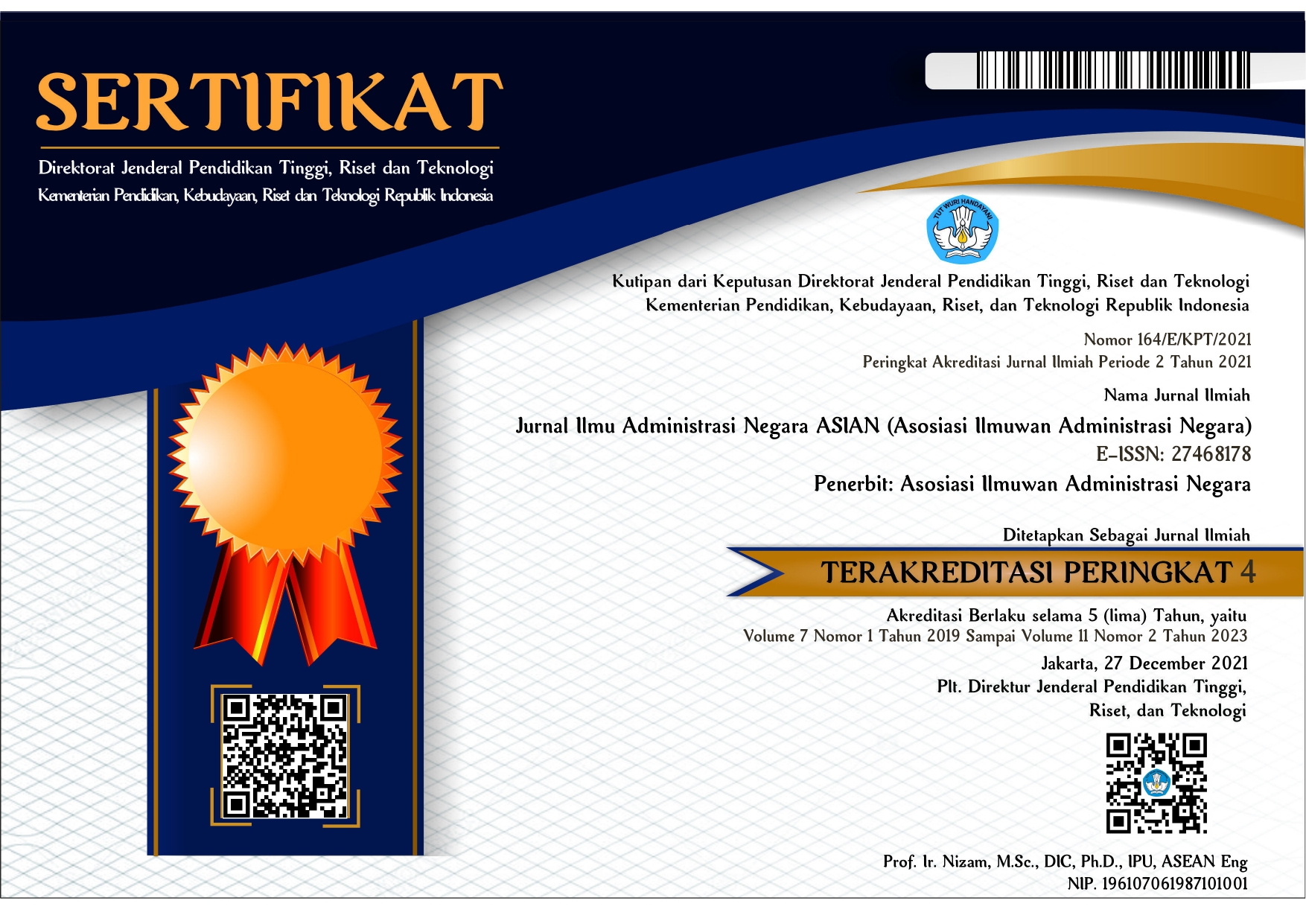Pengembangan Wisata Pesisir Berkelanjutan di Kabupaten Rembang
 Abstract views: 865
,
Abstract views: 865
,
 PDF downloads: 829
PDF downloads: 829
Abstract
Coastal tourism as a form of natural tourism has a very promising development in Indonesia, but unfortunately it is not accompanied by ecological maintenance. Several coastal tourist destinations have experienced a decline in ecological quality, such as the problem of waste that is not managed properly and seawater pollution due to activities on land. The purpose of this study was to analyze whether the development of Karangjahe Beach tourism is in accordance with the principles of sustainable development (Economic Sustainability; Ecology Sustainability & Social Sustainability). The research method used is descriptive qualitative with primary data collection techniques through interviews and Focus Group Discussions, while secondary data is obtained from electronic mass media, previous research results and from related agency report documents. The results of the study indicate that Karangjahe tourism in terms of economic sustainability has been able to provide economic benefits to both the local community and regional income, in terms of Environmental Sustainability the tourist destination is able to change the coastal conditions to be greener, while in terms of social sustainability it is shown from the manager's concern in maintaining local culture. There are several weaknesses in each of these sustainability parameters, so it can be said that the achievement of sustainability has not been optimally achieved. Therefore, it is recommended to the local government and to the managers of tourist destinations to pay more attention to all aspects of sustainability.
Downloads
References
Agustianova, & Eko, D. (2015). Memahami metode penelitian kualitatif; teori dan praktik. Calpulis.
Annafi, Z. (2018). Implementasi Program Wisata Pantai Karangjahe Di Desa Punjulharjo Kecamatan Rembang Kabupaten Rembang. 813–824.
Ashoer, M., Erika, R., Dewi, I. K., Simarmata, M. M., Nasrullah, Mistriani, N., Samosir, R. S., Purba, S., Islahuddin, Meganingratna, A., Permadi, L. A., Purba, B., Murdana, I. M., & Simarmata, H. M. P. (2021). Buku Ekonomi Pariwisata. In R. Watrianthos (Ed.), Repository.Usahid.Ac.Id. Yayasan Kita Menulis. http://repository.usahid.ac.id/2428/1/buku EKONOMI PARIWISATA SUB.pdf
Badan Pengelola Pantai Karangjahe (BPPKJ). (2024). Hasil Interview Pengelola Karang Jahe.
Badan Perencanaan Pembangunan Daerah Kabupaten Rembang. (2024). Hasil Interview Kepala Bappeda Kabupaten Rembang.
Bockish, J. (2012). Transportation Sustainability Rating Systems. http://www.gaite.org/wp-content/uploads/2012/07/GAITE
Dinas Kebudayaan dan Pariwisata. (2024). Data Kunjungan & Pendapatan Tahun 2024.
Handayani, F., & Warsono, H. (2017). Analisis Peran Stakeholders Dalam Pengembangan Objek Wisata Pantai Karang Jahe Di Kabupaten Rembang. Journal Of Public Policy And Management Review, 6, 1–13. https://ejournal3.undip.ac.id/index.php/jppmr/article/view/16543/15936
Kismartini, Purnaweni, H., Prabawani, B., & Yusuf, I. M. (2020). Penta Helix Model for Sustainable Coastal Area Management in Bangka Islands. 510(23), 383–388. https://doi.org/10.2991/assehr.k.201219.058
Korvenkangas, H. (2024). Tourism Policymaking in Finland: A Multilevel Governance Perspective. Tourism Policy-Making in the Context of Contested Wicked Problems: Politics, Paradigm Shifts and Transformation Processes, 17B, 49–63. https://doi.org/10.1108/S1871-31732024000017B004
Masarroh, A. (2024). Tingkat kepuasan pengunjung terhadap kualitas pelayanan objek wisata pantai karang jahe rembang. Universitas Islam Sultan Agung Semarang.
Miles, M. B., Huberman, A. M., & Saldana, J. (2014). Qualitative data analysis. In Sustainability (Switzerland) (3rd ed., Vol. 11, Issue 1). http://scioteca.caf.com/bitstream/handle/123456789/1091/RED2017-Eng-8ene.pdf?sequence=12&isAllowed=y%0Ahttp://dx.doi.org/10.1016/j.regsciurbeco.2008.06.005%0Ahttps://www.researchgate.net/publication/305320484_SISTEM_PEMBETUNGAN_TERPUSAT_STRATEGI_MELESTARI
Nainggolan, D. H., Andarani, P., & Sugianto, D. N. (2023). Assessment of microplastic abundance in Central Java costal waters: a study of Sendang Sikucing‚ Karangjahe‚ and Caruban Beaches. IOP Conference Series: Earth and Environmental Science, 1268(1). https://doi.org/10.1088/1755-1315/1268/1/012032
Pemerintah Kabupaten Rembang. (2024). Peringkat tiga se-Jateng, kunjungan wisata di rembang capai 305.688. Pemerintah Kabupaten Rembang. https://rembangkab.go.id/berita/peringkat-tiga-se-jateng-kunjungan-wisata-di-rembang-capai-305-688/
Pratama, A., & Rizali, R. (2019). Faktor – Faktor yang Mempengaruhi Pendapatan Asli Daerah (PAD) Sektor Pariwisata Di Kabupaten Hulu Sungai Utara Regency. 2. https://doi.org/https://doi.org/10.20527/ecoplan.v2i2.18
Putra, P. C. P. (2022). Pengembangan Potensi Wisata di Desa Punjulharjo Mahasiswa UNDIP Manfaatkan Limbah Kerang Menjadi Produk Souvenir. Kompasiana. https://www.kompasiana.com/pranatacpp_/61d308a5166717012d307d84/pengembangan-potensi-wisata-di-desa-punjulharjo-mahasiswa-undip-manfaatkan-limbah-kerang-menjadi-produk-souvenir
Riyanto, Massie, N. W. G., Hartono, D., & Revindo, M. D. (2020). The Impact of Tourism on Poverty Alleviation and Income Distribution: Evidence From Indonesia. LPEM-FEB-UI Working Paper, 2(047), 1–16. https://www.lpem.org/wp-content/uploads/2020/04/WP-LPEM-047-The-Impact-of-Tourism-on-Poverty-Alleviation.pdf
Rizkiana, M. (2016). Rancangan adaptor sosial dalam adaptasi masyarakat pesisir terhadap pengembangan objek wisata Pantai Karangjahe Desa Punjulharjo, Kabupaten Rembang.
Sastrawan, I. G. A., Ariwangsa, I. M. B., & Sugiarti, D. P. (2023). Sustainable Coastal Tourism Berbasis Kearifan Lokal Di Kawasan Rekreasi Pantai Terbuka Kota Denpasar. Jurnal Destinasi Pariwisata, 10(2).
Suara Merdeka. (2023, August). Hidupkan Kembali Warisan Nenek Moyang , Keunikan Omah Gebyok Jadi Daya Tarik Wisatawan. https://www.suaramerdeka.com/gaya-hidup/049972341/hidupkan-kem…an-nenek-moyang-keunikan-omah-gebyok-jadi-daya-tarik-wisatawan
Suroija, N., Asrori, M., Nugroho, S., Bisnis, J. A., Semarang, N., Prof, J., Sh, S., & Semarang, T. (2021). Strategi Pengembangan Ekowisata Dengan Model Pentahelix Pada Karang Jahe Beach Kab Rembang. Jurnal Perikanan , 4(2), 849–858.
Triyono, J., & Nugroho, D. Y. (2023). Pengembangan Ekowisata Bahari Pantai Karang Jahe Melalui Pembangunan Pariwisata Berkelanjutan. 3, 340–350.
UNWTO. (2024). Sustainable Development. https://www.unwto.org/sustainable-development
Wibowo, B. A., Bambang, A. N., Pribadi, R., Setiyanto, I., Prihantoko, K. E., & Sutanto, H. A. (2022). Strategi Pengelolaan Kawasan Pesisir di Pasar Banggi Kabupaten Rembang dengan Pendekatan Analytical Hierarchy Process (AHP). Jurnal Kelautan Tropis, 25(2), 191–201. https://doi.org/10.14710/jkt.v25i2.12381
Copyright (c) 2024 Jurnal Ilmu Administrasi Negara ASIAN (Asosiasi Ilmuwan Administrasi Negara)

This work is licensed under a Creative Commons Attribution-ShareAlike 4.0 International License.
Authors who publish with this journal agree to the following terms:
1. Copyright on any article is retained by the author(s).
2. The author grants the journal, right of first publication with the work simultaneously licensed under a Creative Commons Attribution License that allows others to share the work with an acknowledgment of the work’s authorship and initial publication in this journal.
3. Authors are able to enter into separate, additional contractual arrangements for the non-exclusive distribution of the journal’s published version of the work (e.g., post it to an institutional repository or publish it in a book), with an acknowledgment of its initial publication in this journal.
4. Authors are permitted and encouraged to post their work online (e.g., in institutional repositories or on their website) prior to and during the submission process, as it can lead to productive exchanges, as well as earlier and greater citation of published work.
5. The article and any associated published material is distributed under the Creative Commons Attribution-ShareAlike 4.0 International License








